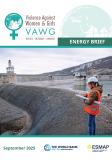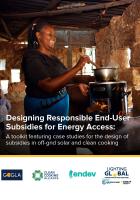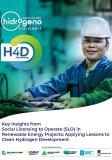Publications
This toolkit provides a framework to design responsible subsidies, building on lessons learned, considering different contexts and objectives, and balancing tradeoffs. The way a subsidy is designed will have an impact on the cost to the government, the speed of rollout, the number of people reached and its scalability, as well as the market-distortion and political risks discussed above. The toolkit provides recommendations on how to inform the subsidy design, options to set specific parameters (targeting, subsidy level, delivery, verification, exit or adjustment), as well as guidelines for communication about subsidies. It also provides recommendations on monitoring, evaluation, and adaptation mechanisms. This toolkit is primarily focused on subsidies for the purchase of off-grid solar products and clean cookstoves; it is limited in its application to fuel or electricity subsidies. Off-grid solar electrification is making the most progress through the selling of devices to end users (on cash or credit through mechanisms such as Pay-As-You Go). This toolkit draws primarily from the experience of subsidizing such sales and is therefore most applicable for the design of subsidies for product purchase. The report however acknowledges the importance of emerging Fee-for Service or Electricity-as-a-Service models, and most of the recommendations in this toolkit are also suitable for these models. However, they are not cited as prominently. Similarly, this toolkit is most applicable to subsidies for the purchase of improved and clean cooking devices. Less so for subsidies for fuels, such as liquefied petroleum gas (LPG), or the electricity consumed by electric cooking devices.




